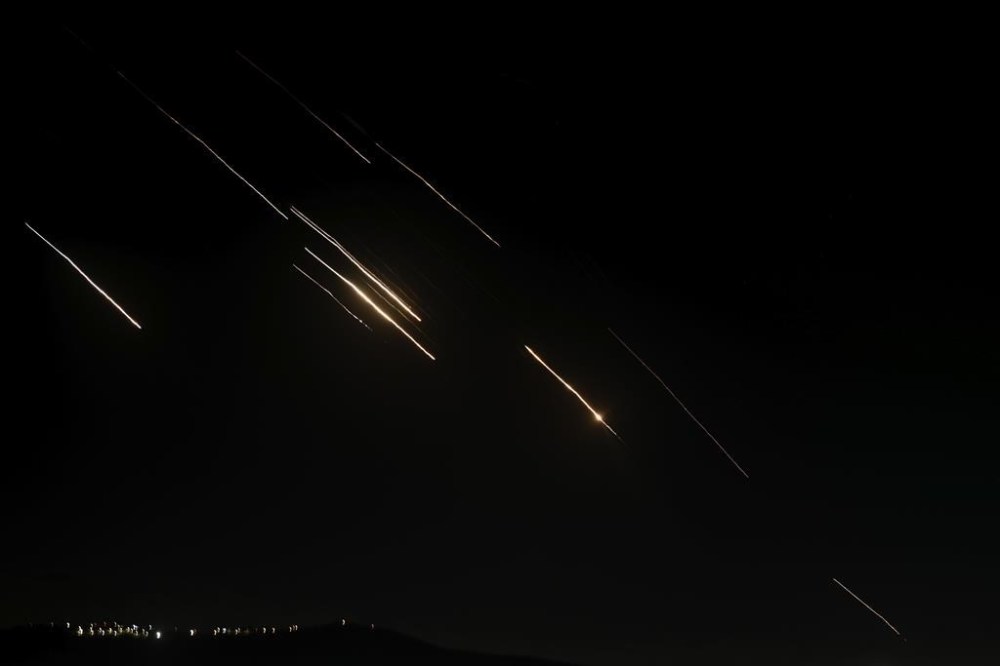Israel’s multilayered air-defense system passes another test in fending off Iranian missile strike
Advertisement
Read this article for free:
or
Already have an account? Log in here »
To continue reading, please subscribe:
Monthly Digital Subscription
$0 for the first 4 weeks*
- Enjoy unlimited reading on winnipegfreepress.com
- Read the E-Edition, our digital replica newspaper
- Access News Break, our award-winning app
- Play interactive puzzles
*No charge for 4 weeks then price increases to the regular rate of $19.00 plus GST every four weeks. Offer available to new and qualified returning subscribers only. Cancel any time.
Monthly Digital Subscription
$4.75/week*
- Enjoy unlimited reading on winnipegfreepress.com
- Read the E-Edition, our digital replica newspaper
- Access News Break, our award-winning app
- Play interactive puzzles
*Billed as $19 plus GST every four weeks. Cancel any time.
To continue reading, please subscribe:
Add Free Press access to your Brandon Sun subscription for only an additional
$1 for the first 4 weeks*
*Your next subscription payment will increase by $1.00 and you will be charged $16.99 plus GST for four weeks. After four weeks, your payment will increase to $23.99 plus GST every four weeks.
Read unlimited articles for free today:
or
Already have an account? Log in here »
Hey there, time traveller!
This article was published 02/10/2024 (421 days ago), so information in it may no longer be current.
JERUSALEM (AP) — Israel’s multilayered air-defense system appears to have passed another test after fending off Iran’s latest missile barrage.
In Tuesday’s night’s strike, Iran fired over 180 missiles toward Israel. The attack set off air raid sirens across the country and sent residents scrambling for shelter, but caused only a handful of minor injuries and limited damage, in large part because many were intercepted or landed in open areas.
It was the latest success for an air-defense system that over the past year has intercepted projectiles fired from Gaza, Lebanon, Syria, Iraq, Yemen and Iran. They have ranged from short-range rockets to medium-range missiles to attack drones to long-range ballistic missiles like those fired Tuesday night.

In Tuesday’s attack, the U.S. and Britain said they assisted in shooting down the incoming missiles. Explosions also were seen over the skies of Jordan, though it remains unclear who carried out the interceptions.
But the vast majority of Israel’s air defense over the past year has been carried out by Israel itself. Over the decades, Israel has developed a sophisticated system capable of detecting incoming fire and deploying only if the projectile is headed toward a population center or sensitive military or civilian infrastructure. Israeli leaders say the system isn’t 100% guaranteed, but credit it with preventing serious damage and countless casualties.
Here’s a closer look at Israel’s multilayered air-defense system:
The Arrow
This system developed with the U.S. is designed to intercept long-range missiles, including the types of ballistic missiles Iran launched on Tuesday. The Arrow, which operates outside the atmosphere, has also been used in the current war to intercept long-range missiles launched by Houthi militants in Yemen.
David’s Sling
Also developed with the U.S., David’s Sling is meant to intercept medium-range missiles, such as those possessed by Hezbollah in Lebanon. It has been deployed on multiple occasions throughout the war.
Iron Dome
This system, developed by Israel with U.S. backing, specializes in shooting down short-range rockets. It has intercepted thousands of rockets since it was activated early last decade – including thousands of interceptions during the current war against Hamas and Hezbollah. Israel says it has a success rate of over 90%.
Iron Beam
Israel is developing a new system to intercept incoming threats with laser technology. Israel has said this system will be a game changer because it would be much cheaper to operate than existing systems. According to Israeli media reports, the cost of a single Iron Dome interception is about $50,000, while the other systems can run more than $2 million per missile. Iron Beam interceptions, by contrast, would cost a few dollars apiece, according to Israeli officials — but the system is not yet operational.





